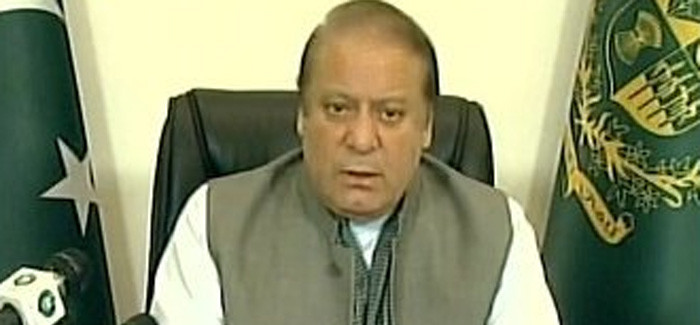PHOTO: Pakistan’s Prime Minister Nawaz Sharif speaks to the nation — but does his military trust him?
Umar Karim writes for EA:
Sunday’s bombing in Lahore, which killed more than 70 people and wounded more than 300, has exposed the rift between Pakistan’s civilian government and its military.
While the attack — claimed by Jamaat ul-Ahrar, a splinter group of Tehrik-i-Taliban Pakistan (TTP) — was the first suicide bombing in a public park, it is the latest violence to test the Government of Nawaz Sharif and a military that wants a tougher approach to “terrorism”.
See also Pakistan Analysis: Explaining the Suicide Bombing in Lahore
The Sharif Government and the armed forces have had differences for years, ranging from negotiations with insurgents to the extent of military response. In 2014 the Government was reluctant to mount an armed campaign against the insurgents of Tehreek-e-Taliban Pakistan in North Waziristan, in the Federally Administered Tribal Areas, after the breakdown of negotiations. The army was uneasy with this position, and an attack on Jinnah International Airport of Karachi proved to be too much for its patience. The military informed the Government that it was starting Operation “Zarb-e-Azb” against the TTP in North Waziristan, the first time it had simply “informed” the Government of its decision and did not ask for permission.
The National Action Plan
On 16 December 2014, gunmen stormed the Army Public School in Peshawar and killed more than 150 students. In the aftermath, all political forces in Parliament endorsed a National Action Plan (NAP) to cleanse Pakistan from terrorism.
There has been swift implementation on some points of the NAP, but many crucial recommendations have been ignored. The Government has failed to provide logistical and financial support for the effective revival of National Counter Terrorism Authority (NACTA). An intelligence-sharing mechanism as well as capacity-building of provincial intelligence and security organizations has not been given attention. While there had been covert operations by law enforcement agencies in Punjab Province against individual suspects, a comprehensive operation against terror financiers, facilitators, and supporters has yet to take place.
This failure in implementation may be because the Federal and Punjab Governments — led by the brothers Nawaz and Shehbaz Sharif — have a client-patron relationship with some of the proscribed groups, with connections that have brought crucial votes in elections. Many elected representatives having open links to these groups.
The Military Acts in Punjab
This state of affairs has visibly frustrated military brass commanders, with the Army Chief of Staff expressing concerns to the Prime Minister. So soon after the Lahore bombing, the Pakistani Army — in a reprise of the December 2014 “Operation Zarb-e-Azb” in North Waziristan — decided to launch operations in Punjab. No permission or consultation sought from the Government; indeed, civilian officials were not even “informed”.
The Government learned of the Army’s decision from a series of tweets by the Director-General of Inter-Services Public Relations, Lt. General Asim Salim Bajwa, near midnight on Sunday:
#COAS chaired a high lvl security mtng.Amongst others DG ISI,DG MI attended.Having evaluated initial info,COAS directed concerned comds&-1
— Gen Asim Bajwa (@AsimBajwaISPR) March 27, 2016
Raids on suspected insurgent hideouts were soon carried out in cities across Punjab. Meanwhile, Prime Minister Sharif, in a speech to the nation, failed to set out any plan of action. The Government had again lost an opportunity to lead from the front.
Sharif insisted, “We are keeping count of every drop of the blood of our martyrs. We will not rest until the cost of this blood is avenged.”
Those words, however, may ring hollow to the Prime Minister’s military. And if so, vengeance may not be taken out not only against the Lahore attackers, but again those in the Government who are blamed for allowing it to occur.

